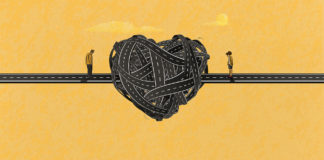She loves me not | Friendship and the friend zone
When I was a child, I used to take a branch of locust tree and, plucking the leaves one by one, I would say: She loves me… she loves me not… she loves me… she loves me not. I cannot remember who I was thinking of when doing this; too many years have gone by since then. However, the refrain is still very...
The game where nobody wins
I was only 13 when I first experienced it. My three best girlfriends handed me a letter. It said they no longer wanted to be my friends. The only reason given was, “The guys pay you too much attention.” After delivering the letter, they simply shunned me.
The mirror is part of us | Friendship and our self-image
A friend carries within him our identity’s safe box.
Thinking errors: What do we do with destructive thought patterns?
What we think about ourselves, over time, becomes our reality. This is a good enough reason to identify thinking errors left running in the background and to seek out strategies for healthier thinking.
The slumber of the proud
One of the best-known stories told by ambitious entrepreneurs today is that if you work hard, you will have a lot.
A second chance: faith in the forgiveness that transforms us
Many years ago, while I was still in high school, our Romanian language and literature teacher assigned us the task of writing a framed story, complete with characters and a plot of our choosing.
For better or for worse | How to love for a lifetime
"Marriage: a book of which the first chapter is written in poetry and the remaining chapters written in prose." (Beverley Nichols)
Five tips for becoming a creative power couple
You meet someone who is in-sync with you. You have the same hobbies and interests, you find the same things funny and you love sharing ideas with them. As your relationship grows beyond the early stages, it becomes clear that your connection shouldn’t be constricted to everyday activities, that you should broaden your horizons and try new things. You realise that your partnership has...
Creativity in the age of acceleration
"Millions of ordinary, psychologically normal people will face an abrupt collision with the future. Citizens of the world's richest and most technologically advanced nations, many of them will find it increasingly painful to keep up with the incessant demand for change that characterises our time." (Alvin Toffler, Future Shock, 1970)
The ideal of a couple
I recently watched a TV show in which the guests, which included professors and psychotherapists, when asked about the feminine ideal in the contemporary world, expressed opinions that seemed strange to me: that such an ideal would no longer be detectable or would no longer have a purpose, today...
How to manage parent-child conflicts during the pandemic
One can hardly overestimate the role the relationship between a parent and their child plays in forming a matrix for the child’s future relationships, whether healthy or dysfunctional. The quality of the parent-child relationship is essential because it directly impacts the child’s social and emotional development, and its quality influences the child's ability to deal with future conflict.
What not to say to a person suffering from depression
Your friend, who is suffering from depression, needs you. What should you tell them in such moments, and what should you not? No matter how well-intended they are, your words can become emotional weapons, whether you like it or not.
COVID-19: Helping children (and others) with viral anxiety
Even in difficult times there are many things we can do at home to help children as well as teenagers to feel less worried.
Connected but lonely?
“Mister Watson, come here, I want to see you.” With this message, Alexander Graham Bell and his assistant, Thomas Watson, launched the telephone. The door had opened to distant, personal and instant contact.
How (and why) should we cultivate our sense of humour?
The importance of humour, including in the workplace, is often undervalued, as a series of studies suggest.


























